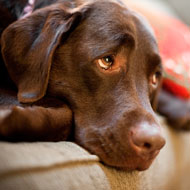'New approach needed' for pet custody battles

Mrs Rook argues that most pet owners view their animals as a member of the family, not as personal property such as a car or piece of furniture.
So-called 'pet custody battles' should take into account the best interests of the animal, an expert in animal law has said.
Deborah Rook, a principal lecturer at Northumbria Law School, says the current law is inadequate at a time when more and more divorcing couples are seeking legal advice to resolve custody disputes about pets.
The current law treats domestic pets as personal property and a property law test is used to resolve disputes over custody.
In her new paper - Who Gets Charlie? The Emergence of Pet Custody Disputes in Family Law - Mrs Rook argues that most pet owners view their animals as a member of the family, not as personal property such as a car or piece of furniture.
Courts in England and Wales should take a more flexible approach, she continues, perhaps by adopting a 'best interests of the animal' test, which some courts in the US and Israel are already using.
While disputes of this kind are a growing problem, Mrs Rook says law students are not taught about the issue.
"Pet custody is not discussed at law schools when students are learning about family law and there is nothing in student text books.
"It's an issue that is becoming more prominent - not just among celebrities but for other people - and I think the current law is inadequate to decide cases fairly."
Animal charity The Blue Cross has recommended that pet owners enter into a 'pet nup' - a pre-nuptial agreement for pets - before they get married. The charity recently partnered with divorce lawyers Lloyd & Platt Company to reduce the number of pets caught in marital disputes.
Mrs Rook says this is further proof that the law needs to be updated. As part of her research she is now looking to speak to couples who are fighting for custody of their pets, or have done so in the past.



 The latest
The latest